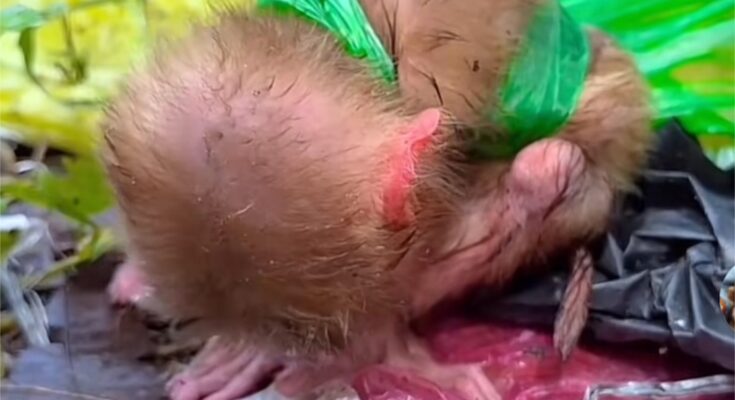In a heartbreaking incident that underscores the devastating impact of pollution on wildlife, a baby monkey was recently discovered trapped inside a plastic bag at a local garbage dump. The young primate, no more than a few months old, had reportedly been stuck without food or water for 2 to 3 days before a passerby noticed its faint cries and called for help. The rescue serves as a chilling reminder of how human negligence and waste mismanagement are endangering vulnerable animals.
A Desperate Cry for Help
The incident took place at a growing landfill site on the outskirts of a rural town, where wild animals often forage for food amidst heaps of rotting waste and plastic debris. It was here that a local sanitation worker heard a faint rustling coming from a pile of trash bags. Upon closer inspection, he was shocked to find a small baby monkey, its fragile body curled up inside a tightly knotted plastic bag. Dehydrated and barely able to move, the monkey had clearly been trapped for several days.
Immediate efforts were made to provide the distressed animal with water and medical attention. Wildlife rescuers who later arrived at the scene confirmed that the monkey was suffering from severe dehydration, heat exhaustion, and shock. Thanks to timely intervention, the animal is now recovering at a local wildlife rehabilitation center.
Pollution and Wildlife: A Growing Crisis
This is not an isolated incident. Across the globe, plastic pollution continues to kill or injure thousands of animals every year. From sea turtles caught in fishing nets to birds choking on bottle caps, the consequences of careless waste disposal are evident and devastating. In areas near human settlements, monkeys and other wildlife are increasingly drawn to garbage dumps in search of food, exposing them to deadly hazards like plastic, broken glass, and toxic waste.
According to environmental experts, plastic bags pose a particular threat to animals. Their transparent, flimsy nature makes them easy to overlook, but once entangled, an animal has little to no chance of escape without outside help. For baby animals, who are curious and often play with found objects, the danger is even more severe.
A Call to Action
The rescue of the baby monkey has sparked concern and conversation within the community and online. Many are calling for stricter regulations on waste disposal and better safeguards for wildlife near landfill sites. Animal welfare groups emphasize the need for secure fencing around dump areas and regular patrols to ensure that animals are not becoming trapped or injured.
Moreover, this incident highlights the urgent need for greater environmental awareness among the public. Simple actions—like reducing single-use plastics, properly disposing of trash, and supporting local conservation efforts—can collectively make a significant impact.
Conclusion
The baby monkey’s survival is a miracle, but it also serves as a stark wake-up call. Nature and wildlife are suffering as a direct result of human actions. If we continue to treat the earth as a dumping ground, it is the innocent animals—like this tiny monkey—that will continue to pay the price. Let this be a reminder: our waste has consequences, and it’s time to take responsibility.



